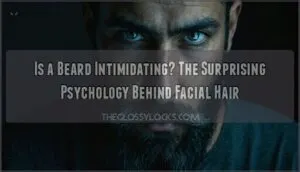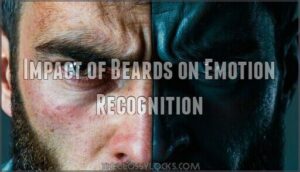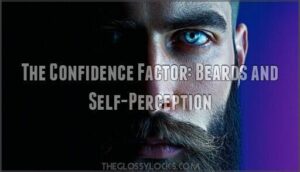This site is supported by our readers. We may earn a commission, at no cost to you, if you purchase through links.

Studies show people process bearded faces differently, detecting anger faster while struggling to recognize softer emotions like sadness.
This isn’t just perception; it’s hardwired psychology dating back to our evolutionary past, where facial hair signaled physical maturity and strength.
The intimidation factor comes from how beards enhance masculine features and create visual weight around the jaw, making even gentle souls look like they could handle themselves in a fight.
However, cultural context, grooming style, and professional settings dramatically influence whether this intimidation works for or against you.
Table Of Contents
- Key Takeaways
- Is a Beard Intimidating?
- The Psychology Behind Beard Intimidation
- Evolutionary Roots of Beard Perception
- Cultural Variations in Beard Intimidation
- Impact of Beards on Emotion Recognition
- Beards and Social Interactions
- The Confidence Factor: Beards and Self-Perception
- Frequently Asked Questions (FAQs)
- Do beards make you intimidating?
- What does a beard say about a person?
- Is having a beard unattractive?
- Do girls prefer a guy with a beard?
- Are people intimidated by beards?
- What does a beard say about someone?
- Is A beard attractive to a girl?
- Does a beard make you look aggressive?
- Do bearded men feel intimidated?
- Are bearded men more aggressive than non-bearded men?
- Conclusion
Key Takeaways
- Your beard makes you appear more intimidating because people’s brains are hardwired to perceive facial hair as a dominance signal—they’ll detect anger faster on your bearded face while struggling to recognize softer emotions like sadness.
- You’ll project more authority and masculinity with a beard due to evolutionary psychology, where facial hair historically signaled physical maturity, strength, and the ability to compete for resources and mates.
- Your beard’s intimidation factor varies dramatically based on cultural context and professional settings—while creative industries embrace facial hair as trendy, conservative fields like finance and law still favor clean-shaven appearances.
- You’ll experience a significant confidence boost when you grow a beard, with about 75% of American men reporting increased self-assurance, which amplifies the intimidating effect others perceive in your presence.
Is a Beard Intimidating?
A beard can absolutely be intimidating, and there’s solid science behind why you might feel that way.
Your brain processes facial hair as a signal of dominance, masculinity, and authority – evolutionary cues that run deeper than modern beard trends.
Your brain instinctively reads beards as power signals—ancient wiring that modern society can’t override.
Whether you’re sporting a full lumberjack style or experimenting with different beard styles, you’re tapping into ancient psychology.
Beard grooming and beard length affect how others perceive your intimidation factor.
Cultural context matters too, but facial hair perception consistently links beards with strength and formidability, making intimidating beards a real phenomenon worth understanding.
In fact, beards are considered secondary sexual characteristics, signaling maturity and influencing perceptions of attractiveness.
The Psychology Behind Beard Intimidation
Psychology shapes how you perceive bearded faces through complex mental processes.
Your brain processes facial hair as a dominance signal, triggering perception biases that link beards with strength and authority.
This social signaling creates an intimidation effect that’s largely unconscious.
Beard psychology involves several key mechanisms:
- Cognitive processing automatically associates facial hair with masculine traits
- Emotional masking occurs when beards obscure facial expressions
- Confidence boost happens when men feel more powerful wearing beards
- Beard stereotypes influence first impressions and social judgments
These facial hair perception patterns affect daily interactions substantially.
Beards also serve as secondary sexual characteristics.
Evolutionary Roots of Beard Perception
You might wonder why beards trigger such strong reactions, but the answer lies millions of years back in our evolutionary past.
Your brain’s response to facial hair stems from ancient survival mechanisms, where beards signaled dominance, physical protection, and genetic fitness in our ancestors.
Signaling Dominance and Aggression
Something primal happens when people see your beard—it triggers ancient wiring that screams "dominance." Your facial hair sends powerful beard aggression cues that evolution hardwired into human perception.
Research shows bearded faces enhance recognition of anger while projecting an intimidating presence that commands respect.
Here’s how your beard dominance signals work:
- Testosterone Display: Your beard advertises high testosterone levels, making others perceive greater aggression and authority in social situations.
- Territorial Marking: Facial hair intimidation stems from evolutionary advantages where beards marked dominant males who controlled resources and mates.
- Social Hierarchy: Your beard signals elevated beard social status, positioning you higher in group dynamics and competitive environments.
- Competitive Edge: Beard intimidation gives you psychological leverage, as others instinctively defer to perceived dominance markers from our ancestral past.
Facial Hair as a Survival Advantage
Your ancestors weren’t just growing beards for style points—facial hair likely provided real survival advantages that helped shape human evolution.
Beyond signaling dominance and aggression, beards offered practical benefits in harsh environments. They provided facial protection against wind, sun, and debris, while also serving as an injury buffer during physical confrontations.
This climate adaptation helped our forebears endure extreme weather conditions that could’ve been life-threatening. In resource competition scenarios, bearded men gained an evolutionary advantage through intimidation without actual violence.
Their enhanced appearance of beard dominance often deterred rivals, reducing dangerous conflicts over food, territory, or mates. This ancestral survival strategy meant bearded individuals could secure resources more efficiently, increasing their chances of reproduction and passing on genes that favored facial hair growth.
Cultural Variations in Beard Intimidation
While evolution shapes our basic response to beards, cultural norms dramatically alter how intimidating you’ll appear with facial hair.
Your beard’s impact depends heavily on where you’re and who’s looking at you.
Cultural variations in beard perception create fascinating differences across societies:
- Religious influences – In Islam and Sikhism, beards symbolize piety rather than aggression, reducing intimidation factors substantially
- Ethnic interpretations – Hispanic men rate beards more favorably than Iranian men, showing distinct cultural preferences
- Urban vs rural settings – City dwellers often view beards as trendy, while rural communities may see them as more traditional or threatening
- Professional views – Conservative industries maintain stricter beard policies than creative fields
Understanding these cultural variations helps you navigate social perception effectively. Considering face shape is important when choosing a beard style to minimize intimidation.
Impact of Beards on Emotion Recognition
When you look at someone’s face, you’re constantly reading emotional cues, but facial hair changes how quickly and accurately you process those signals.
Your brain recognizes anger faster on bearded faces, while sadness becomes harder to detect when it’s partially hidden behind whiskers.
Enhanced Anger Detection
Research reveals that beards act like emotional amplifiers in regards to anger detection.
Your brain processes angry expressions on bearded faces faster and more accurately than on clean-shaven ones.
This anger amplification effect stems from how facial hair frames expressions, enhancing the visual cues that signal aggression.
Studies show bearded men trigger quicker anger recognition because the beard creates contrast around key facial features.
This expression framing makes intimidating emotions more pronounced, helping with social navigation in confrontational situations.
Computer emotion classifiers replicate these findings, confirming that facial cues become more intense with facial hair.
Emotion Bearded Faces Clean-Shaven Faces
Understanding beard intimidation through emotion recognition gives you insight into how others perceive your facial expressions during tense interactions.
Slower Sadness Recognition
Studies reveal that beards conceal sorrow, making it harder for others to recognize sadness on your face. While your beard amplifies anger detection, it works against you when expressing vulnerability. Facial cues that typically signal distress become masked, creating an unexpected barrier to emotional connection.
This slower sadness recognition affects three key areas of your social life:
- Empathy affected – Others struggle to identify when you need support
- Social navigation becomes trickier during vulnerable moments
- Emotional expression feels less effective when seeking comfort
Understanding how your beard influences emotion recognition helps you master social navigation. When you need empathy, consider being more direct with your words since your facial expressions aren’t communicating distress as clearly as a clean-shaven face would.
Beards and Social Interactions
When you’re sporting facial hair, you’re basically wearing a social signal that influences every interaction, from job interviews to first dates.
Your beard doesn’t just change how others perceive your emotions and intentions, it actively shapes the dynamics of professional meetings, romantic encounters, and casual conversations in ways you mightn’t expect, making it a significant factor in your daily interactions and overall perception.
Professional Settings
Your beard’s impact in professional settings depends on three key factors: industry culture, grooming standards, and workplace intimidation dynamics.
In conservative fields, clean-shaven faces still dominate first impressions, while creative industries embrace beard acceptance more readily.
During job interviews, your facial hair can signal authority or unprofessionalism.
A well-maintained look requires professional grooming equipment.
| Industry Type | Beard Acceptance | Leadership Perception |
|---|---|---|
| Finance/Law | Low | Potentially negative |
| Creative/Tech | High | Positive authority |
| Healthcare | Moderate | Depends on grooming |
Professional success often hinges on reading these unspoken industry standards correctly.
Romantic Relationships
Beyond the boardroom, your facial hair substantially impacts romantic relationships and dating success.
Beard attractiveness varies dramatically based on partner preferences and relationship dynamics. Women often perceive bearded men as more committed partners, viewing facial hair as a signal of stability rather than beard intimidation.
Here’s how your beard influences mate selection:
- Stability signals: Partners associate beards with long-term commitment and emotional resilience
- Parenting potential: Facial hair suggests reliability and protective instincts in relationships
- Health indicators: Well-maintained beard grooming demonstrates self-care and attention to detail
- Reduced partner-seeking: Bearded men appear less likely to pursue new romantic opportunities
The Confidence Factor: Beards and Self-Perception
Growing a beard transforms how you see yourself, creating a powerful Self-Esteem Boost that radiates outward.
Your facial hair becomes Psychological Armor, boosting confidence while serving as Identity Expression and a bold Personal Statement.
This Maturity Reflection influences selfperception, where beard confidence directly impacts how others respond to potential beard intimidation.
For those seeking to enhance this aspect, consider exploring resources that promote beard and self-esteem.
The confidence factor in beard psychology proves that your self-assurance shapes social interactions more than the beard itself.
| Confidence Level | Beard Impact | Social Response |
|---|---|---|
| Low Self-Esteem | Minimal boost | Intimidation perceived |
| Moderate Confidence | Noticeable improvement | Mixed reactions |
| High Self-Assurance | Amplified presence | Respect and admiration |
| Peak Confidence | Maximum effect | Leadership recognition |
Frequently Asked Questions (FAQs)
Do beards make you intimidating?
Yes, your beard can make you more intimidating.
Research shows bearded faces enhance perceptions of dominance and aggression, making anger appear more pronounced.
Well-groomed facial hair signals control and confidence, projecting a formidable presence.
What does a beard say about a person?
Around 75% of American men report feeling more confident with facial hair.
Your beard signals dominance, maturity, and masculinity to others, while potentially making you appear older, more formidable, and less approachable in social situations.
Is having a beard unattractive?
Attractiveness isn’t universal—some people find beards incredibly appealing while others prefer clean-shaven faces.
Your beard’s impact depends on grooming, style, and personal preference.
Well-maintained facial hair often enhances masculinity and confidence.
Do girls prefer a guy with a beard?
Women’s preferences for beards vary substantially.
Some find facial hair attractive and masculine, while others prefer clean-shaven men.
Your grooming, confidence, and personality matter more than whether you’re bearded or smooth-faced.
Are people intimidated by beards?
While some find beards ruggedly appealing, others feel genuinely intimidated by them.
You’ll trigger faster anger recognition in people, project dominance naturally, and appear more formidable—especially when your facial hair’s well-groomed and frames your expressions, making you seem more formidable.
What does a beard say about someone?
Your beard communicates masculinity, maturity, and confidence to others.
It signals dominance while suggesting wisdom and experience.
People often perceive you as more formidable, authoritative, and capable of leadership in both personal and professional situations.
Is A beard attractive to a girl?
Research shows 70% of women find bearded men more attractive than clean-shaven ones.
You’ll likely boost your appeal with well-groomed facial hair, as it signals maturity and masculinity that many women find irresistible.
Does a beard make you look aggressive?
Yes, your beard can make you appear more aggressive.
Studies show bearded faces enhance anger recognition and project dominance.
However, a well-groomed beard signals control and confidence rather than raw aggression.
Do bearded men feel intimidated?
Bearded blokes don’t typically feel intimidated themselves.
You’ll actually experience boosted confidence and enhanced masculinity when sporting facial hair.
Research shows about 75% of American men report increased self-assurance with beards, making you feel tougher.
Are bearded men more aggressive than non-bearded men?
You’re not automatically more aggressive just because you’ve got facial hair.
Research shows beards don’t genetically increase aggression, but they can make you feel more masculine and confident, which might translate into more assertive behavior.
Conclusion
Like a double-edged sword, your beard’s intimidating presence cuts both ways.
While research confirms that beards make men appear more dominant and aggressive, this perception isn’t inherently negative.
Whether "is a beard intimidating" becomes an asset or liability depends entirely on context, grooming, and your personal goals.
Understanding these psychological triggers empowers you to harness your facial hair’s impact strategically, giving you an edge in maneuvering social dynamics.
Your beard doesn’t define you—but knowing how others perceive it certainly gives you an edge in maneuvering social dynamics, and helps you to strategically use this knowledge.
- https://academic.oup.com/beheco/article/23/3/481/221987
- https://www.theenglishshavingcompany.com/en_gb/blog/beard-psychology-science
- https://pmc.ncbi.nlm.nih.gov/articles/PMC10501953
- https://kingsmenpremium.com/blogs/news/why-do-men-grow-beards-psychology
- https://www.artofmanliness.com/style/facial-hair/facial-hair-signal









